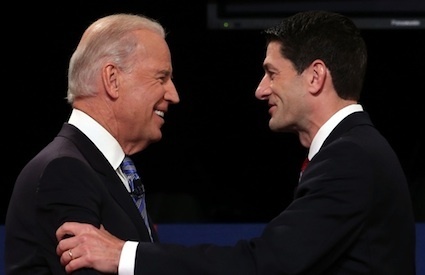My thoughts on VP debate (before seeing the spin)
by ERIC BYLER
Debates are important for the impressions they leave on vast numbers of people. I think the biggest impression the VP debate left on Americans is "Paul Ryan is not ready to be a heartbeat away from the Oval Office." This is a direct consequence of the debate’s solid focus on national security.
I liked the way Joe Biden spoke softly, earnestly, and off the cuff. He showed great command of the issues and "the facts," something to which he often referred. He took advantage of being able to say "I was there" not only during the historic and trying times in the Obama White House, but also during negotiations with President Reagan on reforming social security. Ryan didn’t seem eager to admit that he was there for anything that’s gone on in Congress since his arrival. In fact, he seemed perturbed when Biden reminded him he’d been there and how he’d voted (on deficit exploding measures during the Bush administration for instance).
Only once did Biden seem to be reciting a memorized speech. Maybe it’s just me, but I don’t like to see memorized lines in a debate. I prefer to see the candidate thinking on his or her feet. Ryan really turned me off when he resorted to a memorized and misleading list of attack lines when asked what he would say to a decorated veteran who is concerned about incivility in politics.
By far, the most decisive factor in the debate was the foreign policy chops of moderator Martha Raddatz of ABC News. Raddatz’ expertise, poise, and assertiveness kept both debaters on their toes. The Vice President’s advantage over Mr. Ryan in the arena of national security is so pronounced that one could argue it was unfair of Raddatz to spend so much time focusing on it. Mr. Ryan looked like the odd man out for more than half of the debate. He looked out of his depth, as if he had no more knowledge of national security issues than the average Fox News consumer. At one point, he basically said, "We want to leave Afghanistan too but we have to complain about it because that’s our job." His heart really wasn’t in the complaints. He seemed to be reciting someone else’s words.
The fact that this is the first impression Mr. Ryan will make on millions of voters is unfortunate. It will be difficult for him to overcome. But let’s not forget Bill Clinton once made a "he’s not ready" first impression on a national stage, and he recovered nicely.
If the VP debate had been moderated in the same fashion, and with the same issue focus as the first Presidential debate, Mr. Ryan would have done much better than he did tonight. I wonder if others will say this, but the questions seemed stacked against him.
At least Mr. Ryan avoided the worst thing he could have done, which would have been to treat Vice President Biden as disrespectfully as Mr. Romney did the President a week ago. Ryan was instead extremely polite, and wisely so because my experience tells me that such disrespect targeted at an affable senior citizen who looks like an all-American grandpa would have backfired on him big time. (And, yes, I say "all-American" fully aware that to many, President Obama doesn’t "look" American. I think that’s why we have tolerated such nonsense as the birther conspiracy, for instance, but without ever asking ourselves, would we have tolerated the same toward a white President?)
I don’t think that Ryan increased his negatives. Going from "handsome but unproven/unknown" to "not ready to be President" is pretty much a wash.
I do think that Vice President Biden increased his positives. SNL depicts him as an idiot. But tonight he was sharp, compelling, knowledgeable and likeable. If I look at those same four adjectives with Mr. Ryan in mind, I’d say he was sharp and likeable, but not very compelling and as for knowledgeable, I have a feeling he might have some points docked by the fact-checkers just as Mr. Romney did.
My thoughts on VP debate (before seeing the spin) | Coffee Party Originals | Scoop.it
LIKE My Facebook Page
Follow @EgbertoWillies
Viewers are encouraged to subscribe and join the conversation for more insightful commentary and to support progressive messages. Together, we can populate the internet with progressive messages that represent the true aspirations of most Americans.

 October 11, 2012
October 11, 2012